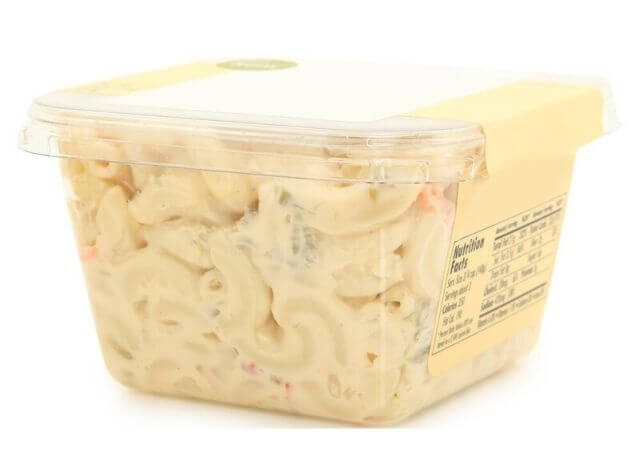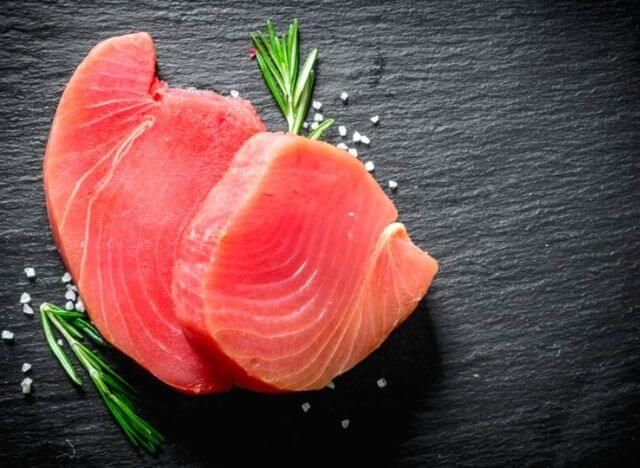Yes, you can freeze tuna.
Both cooked and raw tuna can be frozen and stay safe in freezer for around 3 months. If you freeze tuna in a proper way, the taste and nutrients of the tuna will be guaranteed to be the most perfect.
But how to freeze each type of tuna in the right way? What are the common mistakes when freezing tuna? Are there any differences for freezing each type of tuna? Let’s find out!
Is tuna good for your health?
Tuna is a kind of deep-sea fish and one of the popular seafood because it is rich in omega-3 fatty acid which is beneficial for your eye, brain and heart.
According to research of FDA (Food and Drug Administration), frozen tuna is safer than raw tuna.
People with low immune systems such as the elderly, children, and pregnant women are particularly vulnerable to mercury and parasites in raw tuna. Instead, frozen tuna becomes a safer and smarter choice. As for texture, tuna does not lose weight, affects flavor and nutrients if frozen, and defrosts properly.
Although tuna is extremely nutritious and high in protein and vitamins, eating too much tuna is not good for your health in the long term.
Tuna nutritional value
According to the USDA, 1 can (about 165 gram) of light tuna contains:
- Calories: 191
- Protein: 42g
- Fat: 1.4g
- Sodium: 83mg
- Carbohydrates: 0g
- Fiber: 0g
- Sugar: 0g
Tuna is extremely tasty and can be used to make many delish dishes like sashimi, tuna steak, or for salads. It needs to be kept in cold temperature to remain freshness, otherwise it will go bad immediately.
How much tuna should you eat per week?
As it is recommended by FDA (Food and Drug Administration), adults should eat 3 to 5 ounces (about 85 to 140 gram) of tuna 2-3 times per week. This amount provides enough omega-3 fatty acids and nutrients for your body’s needs.
Tuna contains mercury so people in the potentially high-risk group like pregnant women, babies or young children should have a limited tuna consumption.
If you are a tuna lover, it can be a healthy food in your meals. But remember to keep it in moderation, not to overdo it.
What factors influence the quality of frozen fish?
The key factors affecting the quality of frozen fish are:
- Freezing temperature: The temperature should be kept stable to ensure the freshness of fish.
- Preparation: Proper steps in preparing help fish stay safe in freezer longer.
- Packaging: Using the right container and labeling the dates carefully are needed before placing fish in freezer.
In addition, the following elements also play important roles:
- Wrong defrosting process: It will also cause frozen fish to lose its flavor, nutrition, and color.
- Type of fish: The quality of frozen fish is also directly related to the type of fish, the slaughter process, and the conditions under which the tuna was processed.
To protect the quality of frozen tuna, you need to ensure the above criteria when freezing your fish.
Common mistakes in freezing tuna
Many people apply a sketchy process during preparation before putting tuna in the freezer, specifically the pack-up stage that will bring negative effects on tuna.
If you leave frozen tuna in a condition where it can directly contact with many other foods such as watermelon, vegetables, your tuna will spoil very quickly.
Some common mistakes are:
- Do not use the right containers: You should use an airtight container or cling film to completely seal the tuna. Knowing what types of tuna is going to freezer such as cooked, canned, or fresh tuna, you will apply suitable steps for freezing and know how long your tuna can be kept frozen.
- Forget to label containers: To avoid forgetting about your tuna’s freezing time, you should label tuna containers in the freezer and use freezer safe bags.
- Do not ensure the stable temperature: The most important thing is that you always make sure the temperature is stable because the tuna will easily spoil if the temperature fluctuates.
- Do not soak up the water: Before placing tuna in freezer of containers, you should use paper towels to soak up the water crystals on the surface. If not, the taste and texture of the tuna will completely change when it is in the freezer for a long time.
But how to freeze the tune the right way?
How to freeze the fresh tuna
Following are the ways to freeze different types of tuna.
For the cut tuna
- Use paper towels to dry the cut tuna
- Put tuna into aluminum foil, airtight container or cling film, then close or wrap tightly. You should wrap each piece of tuna separately
- Put tuna in a storage bag and completely remove the available air
- Label the bag carefully and put it in the freezer
For the whole raw tuna
- Start eviscerating the tuna and carefully cleaning
- Dry the tuna with paper towels
- Place the whole tuna on aluminum foil or cling film then wrap tightly
- Put the whole tuna in the freezer container bag and drain the air
- Make sure there is no air in the bag and label it and put it in the freezer
One tip to keep frozen tuna longer is to dip the tuna in ascorbic acid solution or saltwater before wrapping up to reduce bacteria that can spoil the tuna in the freezer.
For the sushi-grade tuna

- Use cling film is to wrap the tuna carefully
- Put tuna in a good-quality storage bag and suck all the air out
- Label and put the bag in the freezer with a temperature at least below -4 degrees Fahrenheit
According to many experts, sushi-grade tuna should not be kept in the refrigerator for too long. The specific time is no more than 2 to 3 days.
However, once in freezer, frozen tuna will remain fresh for up to 3 months with proper freezing process such as carefully wrap, dipping in saltwater, and keep air away.
Further reading: The 7 Best Small Freezers 2021
How to freeze the canned tuna
Tin is not safe for freezing, so you should pour the tuna into a freezer container with airtight lid.
- Open the lid of the canned tuna
- Pour its contents into the plastic zipper storage bag
- Try to squeeze out all the air in the zipper bag to prevent canned tuna from spoiling during freezing
- Stick the expiration date on the front of the storage bag
The perfect time to freeze tuna is within 3 months. You should always maintain a stable temperature of 0 degrees F or below.
You may also like: Freezing Italian Pasta Salad: What Should You Know?
How to freeze favorite dishes with tuna
Tuna macaroni salad

The best advice if you want to freeze tuna macaroni salad is not to freeze the pasta with the dressing.
If you accidentally mix them, use a container with a tight-fitting lid. The best possible freeze period is within 14 days or thereabout.
Mayonnaise in the dressing will spoil easily if you do not follow the following procedure:
- Blanch the vegetables and let them cool down before putting them in a zipper storage bag
- Divide into small portions to speed up the freezing process
- Put in a zip-lock bag or sealed container as long as the air inside is sucked out as much as possible
- Label and dated it to determine when it can be used
Tuna casserole
For tuna casserole, it is best frozen before it is baked.

- Let the tuna casserole sauce cool completely
- Cover the casserole with plastic wrap or cover with an additional layer of aluminum foil
- Label it for 3 months or less
It is important to note that you should not mix cheese and cream in tuna casserole that needs to be frozen.
To enjoy tuna casserole is great with young green peas, fresh tuna, delicious al dente noodles, and a spongy fresh butter panko layer, so care should be taken during the wrapping process to not let air get inside the container.
How long does each type of tuna stay good in the freezer?
Tuna can stay cold longer if you are careful about preparing and packing before putting it in the freezer, and always keeping it at a steady temperature below 0 degrees F.
How long that tuna is safe in freezer will vary for each type of tuna such as cooked or raw, or other types like tinned tuna, whole raw tuna, cut tuna, sushi-grade tuna, tuna casserole, etc.
- Raw tuna: 3 months or thereabouts
- Tinned tuna: 3 months
- Tuna casserole: 2 to 3 months, even less
- Tuna macaroni salad: 2 weeks
Frequently asked questions
Is frozen tuna as nutritious as fresh?
Frozen tuna offers the same nutritional value as of fresh tuna. No nutrients are lost when you freeze tuna.
Can I refreeze the tuna?
You can refreeze tuna because freeze burn is rare in tuna. So, after thaw once, you can still refreeze the tuna. But decide to refreeze quickly and don’t leave frozen tuna out for too long.
How do you defrost tuna?
To defrost tuna, you need to remove the frozen tuna from the freezer and put it into the fridge.
For small portion: You can thaw it fridge for a few hours. Another way is to put in in ice-water for 2 hours.
For large package: It usually take you more time, you may place it overnight.
After thawing, it is your choice to cook the tuna in the microwave of or the ways you want.
Final thoughts
Hopefully, through this article, you can get more useful information to easily freeze tuna at home.
Frozen tuna will bring you many unexpected benefits in life if you know how to freeze tuna the best way. So, try practicing freeze tuna at home today. Thank you for reading this post!
Reference
1. Can You Freeze Tuna-Best Freezing Method, pantrytips.com, Retrieved on Sep. 5, 2021
2. Can You Freeze Tuna-Cooking guide, freezeit.co.uk, Retrieved on Sep. 4, 2021
3.Tuna Casserole, carlsbadcravings.com, Retrieved on Sep. 2, 2021

